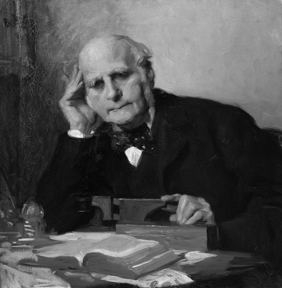Nature versus nurture in personality
 Primitive man living in caves would not have bothered about
personality. However, with the slow but steady process of civilisation,
man became conscious of himself. He tried to project himself in a way
that others will respect and admire him. Soon people started talking
about men and women with warm personalities. Primitive man living in caves would not have bothered about
personality. However, with the slow but steady process of civilisation,
man became conscious of himself. He tried to project himself in a way
that others will respect and admire him. Soon people started talking
about men and women with warm personalities.
At the same time, some people lacked personality. Then there were
personality clashes when two or more people with different character
traits found it difficult to maintain a good relationship with each
other. Leading men such as politicians became a personality cult by
winning the admiration and love of the people.
Francis Galton was the first psychologist to identify nature and
nurture that formed the personality of people. He said that they could
be measured. He experimented with his theory by tracing his own family
tree and those of eminent judges, lawyers, doctors and statesmen. After
a long and arduous research he wrote Hereditary Genius. His research
showed that there were highly talented people in certain families than
among the ordinary population. But he did not attribute it to nature
alone. He realised that there were other factors relating to nurture as
well.
According to Galton, personality consists of elements from two
sources. One is nature. We have inborn and inherited qualities which
cannot be shaken off easily. If a father is dishonest in his
transactions, his son may also inherit such qualities. On the other
hand, a son may inherit the good qualities of his father. The danger is
that nature can set limits to how far we can develop our talents.
Training
On the other hand, nurture is what we experience from birth to death.
Children of ordinary farmers and carpenters become judges and
accountants through nurture. They constantly improve their skills and
abilities through training and learning. Very often we meet ordinary
clerks becoming lawyers and underpaid teachers doing well in other
professions. Like nature, nurture also sets limits to how far we can
develop our talents.
|

Characteristics cling to families.
- Francis Galton (1822 - 1911) |
Although nature and nurture play an important role in fashioning our
personality, nature is finally the determining factor. For instance,
however much a person develops his skills and abilities to become a
successful personality in his chosen field, unconsciously his nature
will be visible at times. We have heard of a top politician urinating
into a swimming pool of a tourist hotel when he attended a public
function. Similarly, many white-clad saint-like men have stooped to
molest schoolgirls. Such incidents happen more due to nature than
nurture.
Galton was a psychologist who had a wealthy Quaker family background.
He was also an authority on many other subjects such as anthropology,
criminology, geography, biology and meteorology. Being a child prodigy,
he could read and write from the age of two. He studied medicine and
mathematics at two leading universities. However, his studies were
disrupted by a sudden mental breakdown. These facts show how his nature
and nurture contributed in building his personality.
Dynamic personality
Today, more than in the past, we see people holding top posts lacking
personality. At times, we come across lesser-known people who possess a
dynamic personality. No doubt, education plays a vital role in improving
our personality. However, some educated people do not have the
personality. That means there is something missing somewhere in our
understanding the problem of personality.
Galton once sent a questionnaire to members of the Royal Society to
ascertain their interests and affiliations. In his subsequent book
English Men of Science he said that where nature and nurture were forced
to compete, nature triumphed. External influences and appearance can
make a difference.A well-dressed man carrying a briefcase and an
expensive mobile phone may look important and dignified. But when he
opens his mouth, he will reveal his real nature. In Galton’s words,
“Nothing can efface the deeper marks of individual character.”
The nature-nurture debate continues even today. Some psychologists
favour Galton’s theory now known as eugenics according to which people
could be “bred” like horses giving them certain characteristics. Others
believe that every baby is a tabula rasa or a “blank slate” because we
are born equal. Modern psychologists, however, say that nature and
nurture are crucially important in human development and personality
building. |

